Yam: Tyrannical Hydra-Like Sea Monster God Cast Out Of Heaven
A. Sutherland - AncientPages.com - Yam (Yamm), (in Hebrew, means ‘sea’) is best known from Canaanite tablets unearthed at Ugarit and related in myths to Baal, the son of the supreme god El, and the universal god of fertility who was titled ‘Prince, Lord of the Earth.’
Destruction of Leviathan, engraving by Gustave Doré, 1865. Credit: Public Domain
The tablets inform that at the beginning of time, Yam was awarded the divine kingship by El, the chief god of the pantheon - father of all the other gods “Creator/Possessor of Heaven and Earth” (except for Baal).
Yam, a tyrannical, monstrous deity of the sea and other watery realms, was in constant conflict with Baal. These two gods met each other in combat on the plains of heaven and, after his defeat, Yam was cast out of heaven and into the depths of chaos.
Despite what happened to him, he remained in conflict with Baal and wished to dethrone him to rule in heaven. So he came back from the depths beneath the seas to battle for heaven’s gates.
In some versions of the myth, Yam and Baal repeatedly kill each other, resurrect, fight again and die, only to return to life once more. This repeating mythological battle may symbolize furious winter sea storms, which usually calmed in the spring.
Goddess Astarte. Credit: A. Ocram - Public Domain
Some myths found in a fragmented ancient papyrus say that the goddess Astarte was deeply discontented by tributes Yam demanded from other gods. Yam threatened to flood the whole earth if he did not get what he wanted.
El instructed the craftsman-god, Kothar wa-Khasis, to build a palace on his (El’s) grounds and officially announced that his (eldest or favorite?) son is to be known as ‘El’s Beloved Yam’ and as Master, he probably authorizes Yam to banish Baal from his throne.
God El - King of the Gods. Gilded statuette of El from Megiddo. Credit: Daderot - Public Domain
But Yam still wanted more. He requested that the gods surrender Baal to be his bondservant. El finally agreed, but Baal refused and instead decided to meet Yam in a decisive battle.
After a furious fight, using two special weapons delivered to him by the craftsman Kothar, Baal managed to defeat Yam, scattering the pieces of his body. The battle was won, and now the kingship finally belonged to Baal.
In the Egyptian version of the story, the monster god Yam was defeated by Seth, with whom Baal was identified in the Ugaritic myth.
Yam is not clearly described in the available sources and has no clear appearance, though he seems to be serpentine in form.
Some believe that Yam may have had a great, seven-headed sea monster in his following, or he could also himself have been that monster.
According to some scholars, Yam is identical with the god Lotan (Hebrew: Leviathan) – a representation of a serpent or a many-headed dragon and is the model for Satan in the Biblical Book of Revelation (12:9).
Yam seems entirely motivated by rage, his actions are apparent, and he makes no secret of his disrespect for the other gods and their weak and clearly imperfect creations - humans.
Additionally, this figure is also associated with the Christian devil, with a serpent present in the Garden of Eden in the Book of Genesis, chapter 3.
Scholars know of no ancient Egyptian cult related to the monstrous Yam. However, it is known that Egyptian seafarers widely feared Yam. In addition, if we assume that Yam was also Satan, he must have been feared by many others as well.
Written by – A. Sutherland - AncientPages.com Senior Staff Writer
Updated on June 27, 2021
Copyright © AncientPages.com All rights reserved. This material may not be published, broadcast, rewritten or redistributed in whole or part without the express written permission of AncientPages.com
Expand for referencesSources:
Grottanelli, Kings and Prophets
J.B. Pritchard, Ugaritic Myths, Epic and Legends
More From Ancient Pages
-
 A Scientist’s Powerful Dream Revealed An Extraordinary Archaeological Discovery
Featured Stories | Jan 25, 2019
A Scientist’s Powerful Dream Revealed An Extraordinary Archaeological Discovery
Featured Stories | Jan 25, 2019 -
 A 1,500-Year-Old Basilica Re-Emerged Due To Withdrawal Of Waters From Lake Iznik
Archaeology | Sep 12, 2020
A 1,500-Year-Old Basilica Re-Emerged Due To Withdrawal Of Waters From Lake Iznik
Archaeology | Sep 12, 2020 -
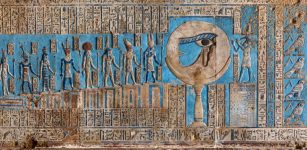 Secrets Of Egyptian Blue – World’s Oldest Artificial Pigment And Its Extraordinary Properties
Featured Stories | May 10, 2021
Secrets Of Egyptian Blue – World’s Oldest Artificial Pigment And Its Extraordinary Properties
Featured Stories | May 10, 2021 -
 On This Day In History: Battle of Devil’s Hole Was Fought – On Sep 14, 1763
News | Sep 14, 2016
On This Day In History: Battle of Devil’s Hole Was Fought – On Sep 14, 1763
News | Sep 14, 2016 -
 Secrets Of The Spiral Symbol Left By Ancient Civilizations
Ancient Symbols | Mar 11, 2016
Secrets Of The Spiral Symbol Left By Ancient Civilizations
Ancient Symbols | Mar 11, 2016 -
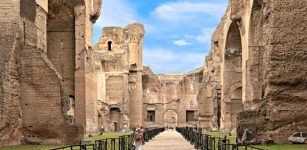 Baths Of Caracalla: Italian Antique Thermae Complex For Leisure, Gossip, Business And Socialisation
Featured Stories | Dec 4, 2023
Baths Of Caracalla: Italian Antique Thermae Complex For Leisure, Gossip, Business And Socialisation
Featured Stories | Dec 4, 2023 -
 4,000-Year-Old Serpent-Shaped Wooden Stick Unearthed in Southern Finland
Archaeology | Jun 30, 2021
4,000-Year-Old Serpent-Shaped Wooden Stick Unearthed in Southern Finland
Archaeology | Jun 30, 2021 -
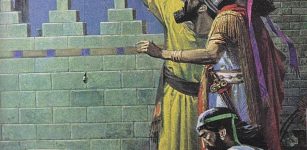 Babylonian Astronomers Used Geometry To Track Jupiter – 1,400 Years Before Europeans
Archaeology | Jan 28, 2016
Babylonian Astronomers Used Geometry To Track Jupiter – 1,400 Years Before Europeans
Archaeology | Jan 28, 2016 -
 Urban Resiliency Lie Within Ancient Cities – New Study Suggests
Archaeology | Jul 25, 2023
Urban Resiliency Lie Within Ancient Cities – New Study Suggests
Archaeology | Jul 25, 2023 -
 Tavern And Mysterious Tools Discovered In North Carolina – Stunning Ancient Time Capsule
Archaeology | Jun 19, 2019
Tavern And Mysterious Tools Discovered In North Carolina – Stunning Ancient Time Capsule
Archaeology | Jun 19, 2019 -
 Were The Viking Berserkers True Or Drug Addicted Warriors Fighting In Trance?
Featured Stories | Feb 3, 2015
Were The Viking Berserkers True Or Drug Addicted Warriors Fighting In Trance?
Featured Stories | Feb 3, 2015 -
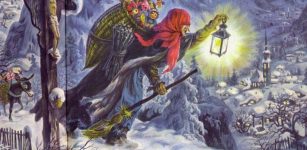 Beautiful Legend Of La Befana – Witch Who Delivers Gifts To Children In Italy On Epiphany – Twelve Days After Christmas
Ancient Traditions And Customs | Dec 3, 2017
Beautiful Legend Of La Befana – Witch Who Delivers Gifts To Children In Italy On Epiphany – Twelve Days After Christmas
Ancient Traditions And Customs | Dec 3, 2017 -
 North America Is Named After An Italian Explorer
Ancient History Facts | Mar 1, 2016
North America Is Named After An Italian Explorer
Ancient History Facts | Mar 1, 2016 -
 On This Day In History: George Bernard Shaw Died – On Nov 2, 1950
News | Nov 2, 2016
On This Day In History: George Bernard Shaw Died – On Nov 2, 1950
News | Nov 2, 2016 -
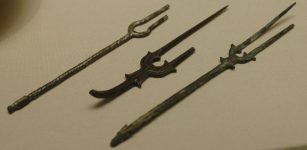 Troublesome Ancient History Of Forks That Were Long A Shocking Sensation
Featured Stories | Nov 20, 2023
Troublesome Ancient History Of Forks That Were Long A Shocking Sensation
Featured Stories | Nov 20, 2023 -
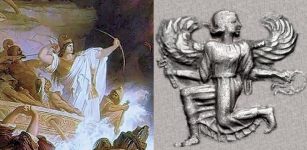 Artemisia I Of Caria – Pirate Queen And Ally Of Xerxes I Was Loyal To No-One Except Herself
Featured Stories | Mar 4, 2019
Artemisia I Of Caria – Pirate Queen And Ally Of Xerxes I Was Loyal To No-One Except Herself
Featured Stories | Mar 4, 2019 -
 Tides And Hurricane Activity Impacted The Maya Civilization – What Can This Tell About Modern Climate Change?
Archaeology | Aug 18, 2021
Tides And Hurricane Activity Impacted The Maya Civilization – What Can This Tell About Modern Climate Change?
Archaeology | Aug 18, 2021 -
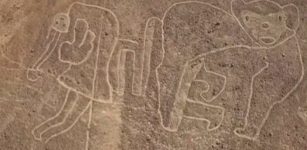 Drones Discover 25 Never-Before-Seen Geoglyphs Near Famous Nazca Lines
Archaeology | Jun 4, 2018
Drones Discover 25 Never-Before-Seen Geoglyphs Near Famous Nazca Lines
Archaeology | Jun 4, 2018 -
 On This Day In History: Martin Luther Was Excommunicated From The Catholic Church – On Jan 3, 1521
News | Jan 3, 2017
On This Day In History: Martin Luther Was Excommunicated From The Catholic Church – On Jan 3, 1521
News | Jan 3, 2017 -
 Descent Of Orpheus To Underworld Ruled By Hades
Featured Stories | Jan 14, 2018
Descent Of Orpheus To Underworld Ruled By Hades
Featured Stories | Jan 14, 2018



